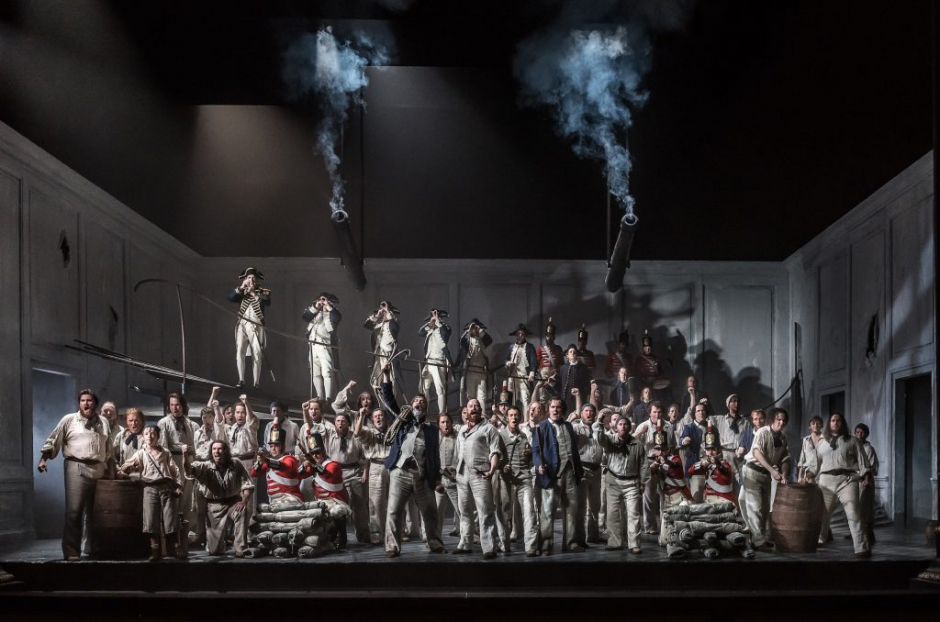Billy Budd, Opera North at The Lowry, directed by Orpha Phelan; November 10 2016.
There is something similar about a late eighteenth-century warship and an opera company. Both are sophisticated technologies of production that rely on the hierarchical division of labour to produce spectacular effects. This similarity was stressed in Opera North’s recent production of Benjamin Britten’s Billy Budd at The Lowry. On stage the graceful deck of a ship arches over the dimly lit, cramped corners below, as officers order the ordinary sailors to swab the decks, the lone voices of the officers alternating with the deep rumble of the chorus.
It is a vision of what was, at the time, one of the most sophisticated technologies to have been developed in the western world, as a panopticon, not only a machine for making war. In this reading of the French Revolutionary Wars (and of course Melville, the author of the novella Billy Budd was fully aware of this in the source text) the warship is the experimental laboratory for the hierarchical disciplinary practices that Foucault describes being put into practice with such devastating effect in the civil institutions of the nineteenth-century. A parallel is produced between opera and ship.
This is the world into which Billy Budd enters, press-ganged from the significantly named merchant vessel The Rights o’ Man, he brings a flaw aboard. This is the word that E.M. Forster’s libretto stresses again and again and which is echoed by the haunting, discordant music. What this flaw is is never wholly clear. It might be some sort of revolutionary sympathy; it might be Billy’s beauty and youth disrupting the compulsory heterosexuality of the ship (this is an opera in which only men appear and whatever else it might be about, it is about homosociality); it might be his angelic goodness, so angelic as to seem to go beyond good and evil; it is expressed both by Melville and by the opera by a stammer, that prevents both the smooth functioning of language, of the music and of the ship itself.
Aboard the warship, The Indomitable, the master-at-arms, John Claggart, takes a dislike to Billy, though again the reasons why are unclear: jealousy, repressed homosexuality or simply the motiveless malignancy of evil. Claggart frames Billy for mutiny and has him brought before the fair and popular captain Edward Fairfax Vere who invites Billy to defend himself. Prevented from defending himself by his stammer, Billy punches Claggart who falls dead, and being in enemy waters, Vere is forced to call a drumhead court martial and sentences Billy to death against his own judgement and in strict obedience to the letter of the law: ‘Struck down by an angel of God, but the angel must hang.’ In a prologue and epilogue to the opera, in a divergence from the novel, Vere, now an old man, wrestles with his conscience about his decision to hang Billy Budd.
It’s a magnificent narrative, both simple and vertiginously complex, with a magnificent libretto and magnificent music, and Opera North’s production is equal to it. Roderick Williams’s Billy Budd is genuinely angelic, with an air of grace and ever so slight confusion, as though he is genuinely innocent of all that happens around him, befitting of the epithets that the sailors give him, ‘Baby,’ and ‘Beauty.’ The martial flourishes in the score during the battle sequences are never allowed by the orchestra, conducted by Garry Walker, to infect the return to haunting sparseness. It confirms a distance from the action that is demanded by the prologue and epilogue, which explicitly require the audience to make moral judgements on what they see before them, including, perhaps, a certain unease with the violence of war. Particularly impressive is Alastair Miles’s Claggart whose chilling aria when he vows to bring down Billy Budd is the highpoint of this production – full of malice, desire and a marked melancholy that insists on several interpretations of his character simultaneously.
Alongside these performances is an almost Brechtian attitude to staging, that suits the modernism of source, libretto and music, as well as the demand for moral judgement. Aside from the disciplinary and hierarchical stage, key moments are presented as tableaux, particularly the battle scene, which ends with the massed ranks of chorus and principals static and facing the audience, as though in parody of battle. Most unsettlingly of all, the ship is enclosed in a panelled room, making literal Melville’s subtitle, An Inside Narrative. This is the room that Vere emerges from for prologue and epilogue and never allowing the audience to forget for one moment that they are, like Vere, being forced to make a decision on what unfolds before them, suspended between the discipline which not only produces a warship under full sail, but the strict shape of the opera, and the irrepressible, unresolved, innocent, sexual, tentative joy of the flaw that both offers an angelic escape route, brings the whole edifice down, and ends in death.

